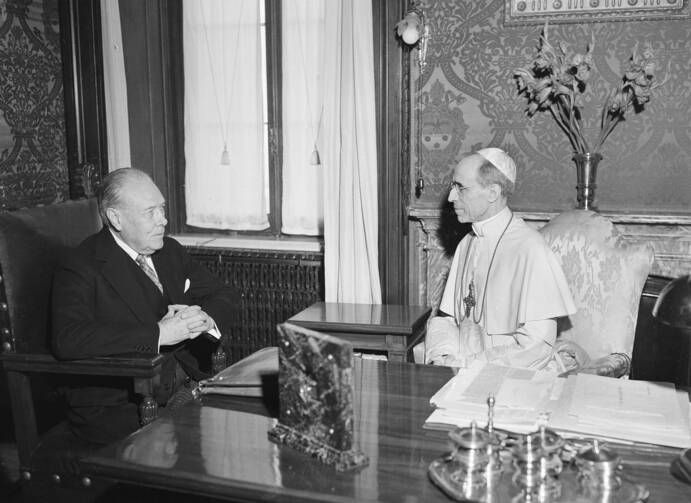ROME (AP) — Pope Francis has ordered the online publication of 170 volumes of its Jewish files from the recently opened Pope Pius XII archives, the Vatican announced Thursday, amid renewed debate about the legacy of its World War II-era pope.
The documentation contains 2,700 files of requests for Vatican help from Jewish groups and families, many of them baptized Catholics, so not actually practicing Jews anymore. The files were held in the Secretariat of State's archives and contain requests for papal intervention to avoid Nazi deportation, to obtain liberation from concentration camps or help finding family members.
The online publication of the files comes amid renewed debate about Pius’ legacy following the 2020 opening to scholars of his archives.
The online publication of the files comes amid renewed debate about Pius’ legacy following the 2020 opening to scholars of his archives, of which the “Jews” files are but a small part. The Vatican has long defended Pius against criticism from some Jewish groups that he remained silent in the face of the Holocaust, saying he used quiet diplomacy to save lives.
One recent book that cites the newly opened archives, “The Pope at War,” by Pulitzer Prize-winning historian David Kertzer, suggests that the people the Vatican was most concerned about saving were Jews who had converted to Catholicism, the offspring of Catholic-Jewish mixed marriages or otherwise related to Catholics.
Kertzer asserts that Pius was loath to intervene on behalf of Jews, or make public denunciations of Nazi atrocities against them, to avoid antagonizing Adolf Hitler or Italy’s Fascist dictator Benito Mussolini.
The Vatican's foreign minister Paul Gallagher said it was hoped that the digital release of the “Jews” files would help scholars with research, but also descendants of those who had requested Vatican help, to “find traces of their loved ones from any part of the world.”
In an article for the Vatican newspaper L’Osservatore Romano, Gallagher said the files contained requests for help, but without much information on outcomes.
“Each of these requests constituted a case which, once processed, was destined for storage in a documentary series entitled ‘Jews,’” he wrote.
“The requests would arrive at the Secretariat of State, where diplomatic channels would try to provide all the help possible, taking into account the complexity of the political situation in the global context,” Gallagher wrote.
He cited one case found in the files: A Jew who was baptized Catholic in 1938, Werner Barasch, who sought help from the pope in 1942 to be freed from a concentration camp in Spain. According to the archives, his request was forwarded to the Vatican embassy in Madrid, but the documentation then went cold.
“As for the majority of requests for help witnessed by other cases, the result of the request was not reported,” Gallagher wrote. “In our hearts we immediately inevitably hope for a positive outcome, the hope that Werner Barasch was later freed from the concentration camp and was able to reach his mother overseas.”
Subsequent online research, including at the U.S. Holocaust Memorial Museum, found that Barasch did indeed survive and was able to join his mother in the United States in 1945, Gallagher reported.








